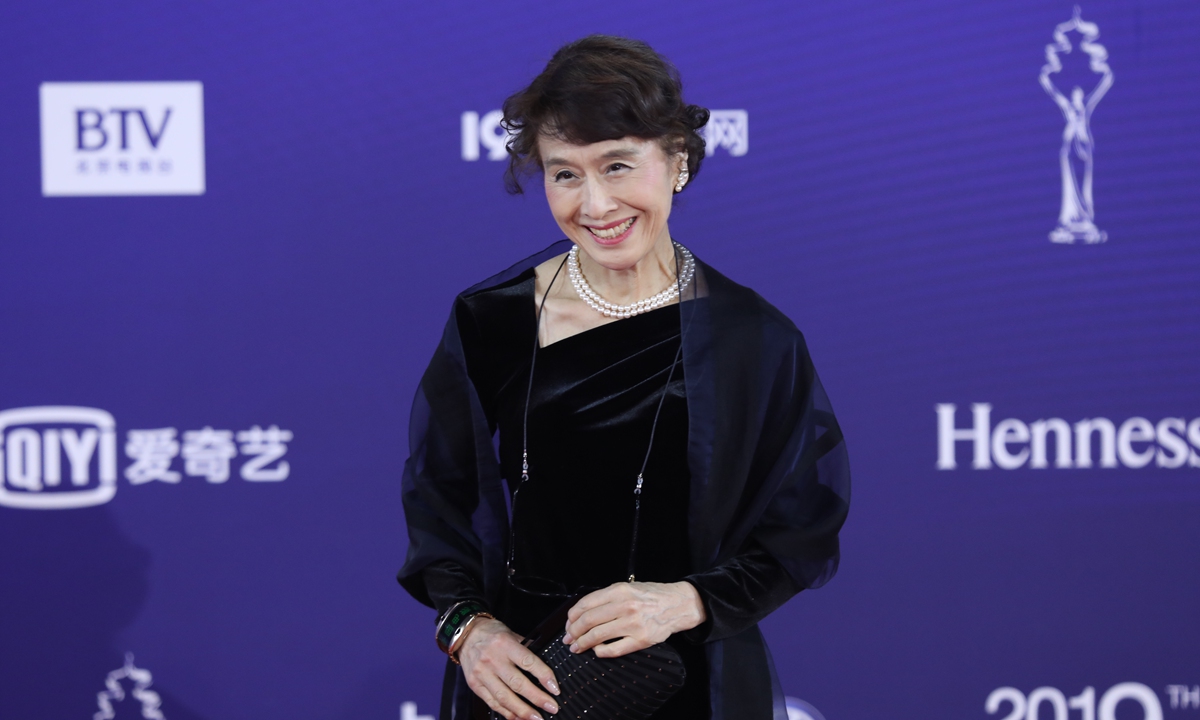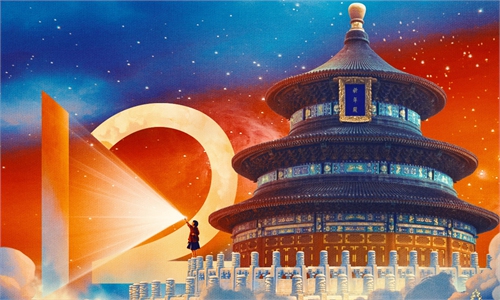ARTS / FILM
Veteran actress Komaki Kurihara devoted to China-Japan cultural exchange for over 25 years
Film diplomacy

Komaki Kurihara Photo: IC
In 1978, driven by the establishment of China-Japan Treaty of Peace and Friendship, the cultural exchanges between China and Japan brought films such as The Love Unto Death and Sandakan No. 8 to the Chinese mainland for the first time. The two countries are about to welcome the 50th anniversary of the normalization of bilateral relations on September 29.Japan's glam actress Komaki Kurihara was a true eyewitness to this change, and not only had taken part in such films that were loved by Chinese audiences who still can recite their lines, but also was dedicated to promoting understanding between the two countries through films even until today.
With a lot of unforgettable memories during her 36 visits to China, the 77-year-old artist became more determined about her belief that the cultural exchanges between China and Japan "cannot be shaken" irrespective of time and circumstance.
A journey to China
Kurihara's bond with China originated during the 1970s when her two popular films, Sandakan No. 8 (a miserable story in brothels) and romance Love Unto Death were first shown in China.
Playing the role of a truth-seeking journalist in Sandakan No. 8, Kurihara's film gained mass popularity in China and became one of the highest-grossing Japanese films at the Chinese box office at the time.
"I know many Chinese moviegoers have watched Sandakan No. 8 and The Love Unto Death. These two movies are in fact my starting point in participating cultural exchanges between China and Japan," Kurihara told the Global Times.
Soon after her film's success in China, riding the "new wave" of China's reform and opening-up in 1979, Kurihara paid her first-ever visit to China with a Japanese film delegation where she got know many popular Chinese actors and directors at the time.
Kurihara recalled that she met Chinese veteran actresses Qin Yi and Liu Xiaoqing, and received an olive branch delivered by famed Chinese director Xie Jin, who chose her to star in China-Japan co-produced film Bell of Purity Temple in 1992.
The film tells a story about the life of a Japanese infant left in China. What touched the Japanese actress the most was the passion and professionalism of Chinese film makers, and also the fast developing Chinese film industry.
"I never felt any difference in culture or film-making habits. Chinese actors are very professional and took care of me on set. After the shooting in Shanghai we took a trip to Hangzhou with director Xie. The beauty of the West Lake and enthusiasm of Chinese moviegoers toward Japanese filmmakers have moved me very much," Kurihara told the Global Times.
Shi Chuan, vice chairman of the Shanghai Film Association, told the Global Times that the peak of exchanges between the two countries was during the 1980s and 1990s when the channels of exchange were diverse and works introduced to each other cover many themes and forms, including movies, TV dramas and animations.
Cultural-exchange messenger
Though Kurihara decided to gradually fade out from her big screen acting career after Bell of Purity Temple, it was only a beginning for her to be fully devoting to the China-Japan film exchanges.
She developed a close relationship with Geng Zhong, an actress who took part in the classic Japanese film Love Letter. The two actresses endeavored to promote the communication between Chinese and Japanese film producers even during the tensed China-Japan relations caused by the then Japanese Prime Minister Junichiro Koizumi's repeated visits to the Yasukuni Shrine. It enshrines Japan's infamous Class-A war criminals who symbolized Japan's war atrocities and militarism during World War II.
Thanks to their efforts, the Japanese film week at the Shanghai International Film Festival and Chinese film week at the Tokyo International Film Festival have been regular fixtures for 16 years. Many Japanese audiences from as far away as Okinawa and Hokkaido made a special trip to Tokyo to see Chinese films. They are eager to know China through movies.
Kurihara said that through such exchanges between Chinese and Japanese films, she has seen people's enthusiasm and love about films, an important part of cultural exchanges between China and Japan. Kurihara loves new Chinese films such as The Wandering Earth and Hi, Mom.
"Along with the developing production standards and scales, and also the wonderful performance of Chinese actors, China's film industry is now becoming one of the most important markets in the world."
Undertaking the role of the president of Japan-China Cultural Exchange Association, Kurihara said that cultural and artistic exchanges at any time have the power to transcend difficulties, and that no circumstances can shake the Japanese and Chinese people's determination on peace and friendship.
She also said that China and Japan are currently planning on a new co-production film about the Chinese Zen master Yin Yuan, who helped boost China-Japan exchanges dating back to the 17th century.
She will do everything she can to support the release of the co-production in both countries.
"We are full of hope for the next 50 years of friendship between Japan and China," she noted.



